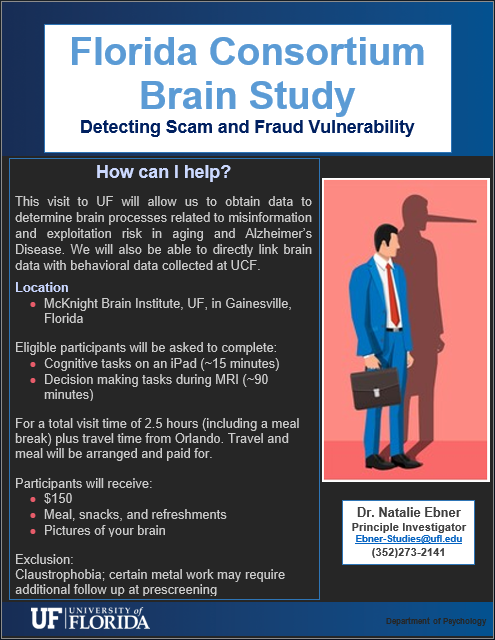CURRENT STUDIES: Participate Today!
We are currently recruiting volunteers for the studies listed below.
If you are interested, please contact us by phone at (352) 340-1680 or (352) 273-2134 or by email at psy-ebnerlab@psych.ufl.edu. Inquires can also be submitted through our “Contact Us” form at the bottom of the webpage.
Florida Consortium Brain Study:
|
|
The Deciding Brain Study:
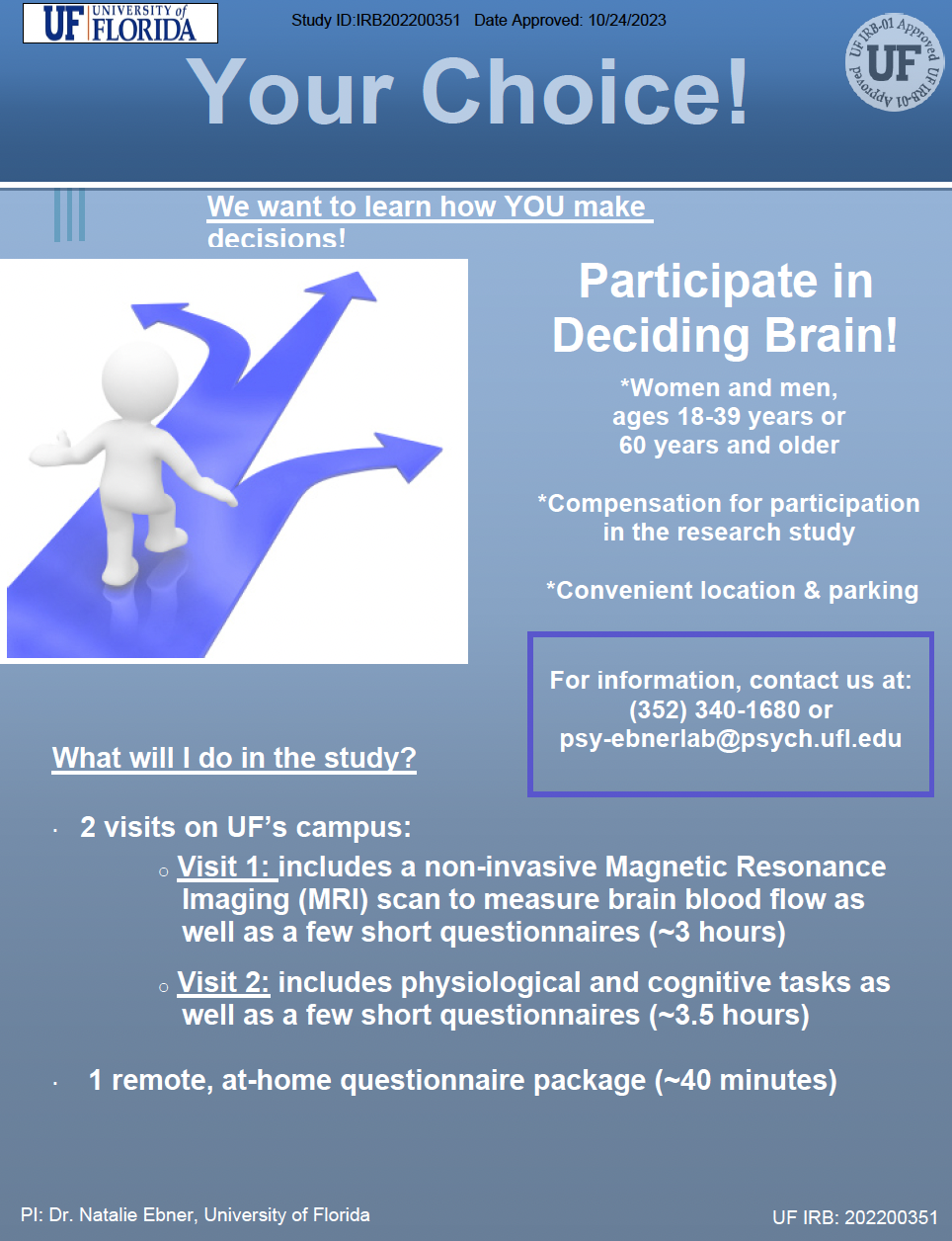
- The focus of this study is to learn how you make decisions.
This study includes: 2 on-campus sessions (an MRI session, and a Physiological session) and one remote questionnaire package to fill out. Participants will be compensated at the end of the study. For this study we are currently recruiting women and men between the ages of 18-39 or 60 years and older.
- Click to View Official Study Flier
Understanding Cognition, Oxytocin and Pain in Elders (UCOPE):
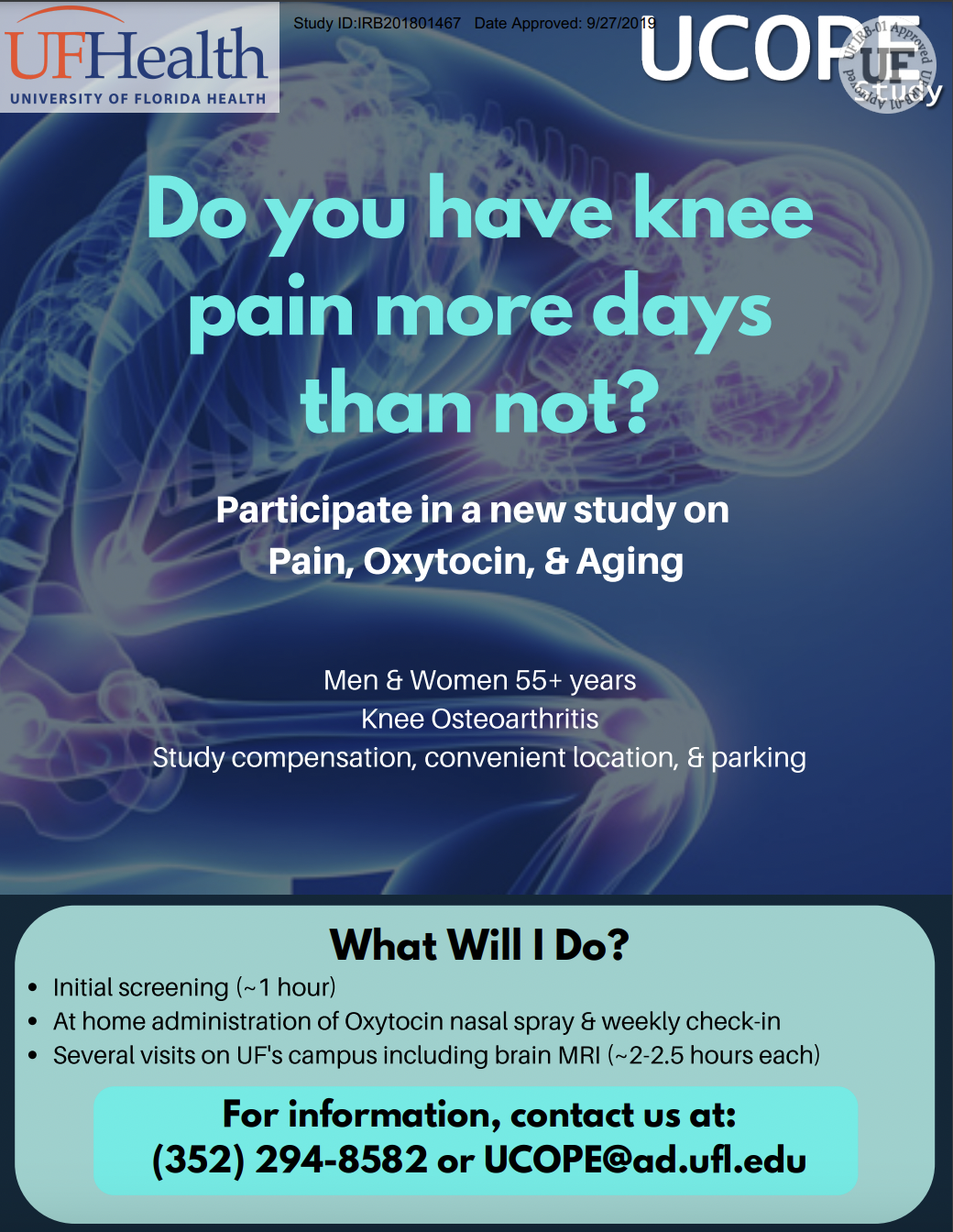
- The focus of this study is to examine the effect of Oxytocin on chronic pain in older adults with knee osteoarthritis.
The initial screening visit will be about one hour. At home, you will take Oxytocin nasal spray and complete weekly check-ins with the study team. There are several visits to UF’s campus including a brain MRI. Those visits will last approximately 2-2.5 hours each. For this study we are currently recruiting people 55 years of age and older with knee pain.
- Click to View the Official Study Flier
OxyAging Study:
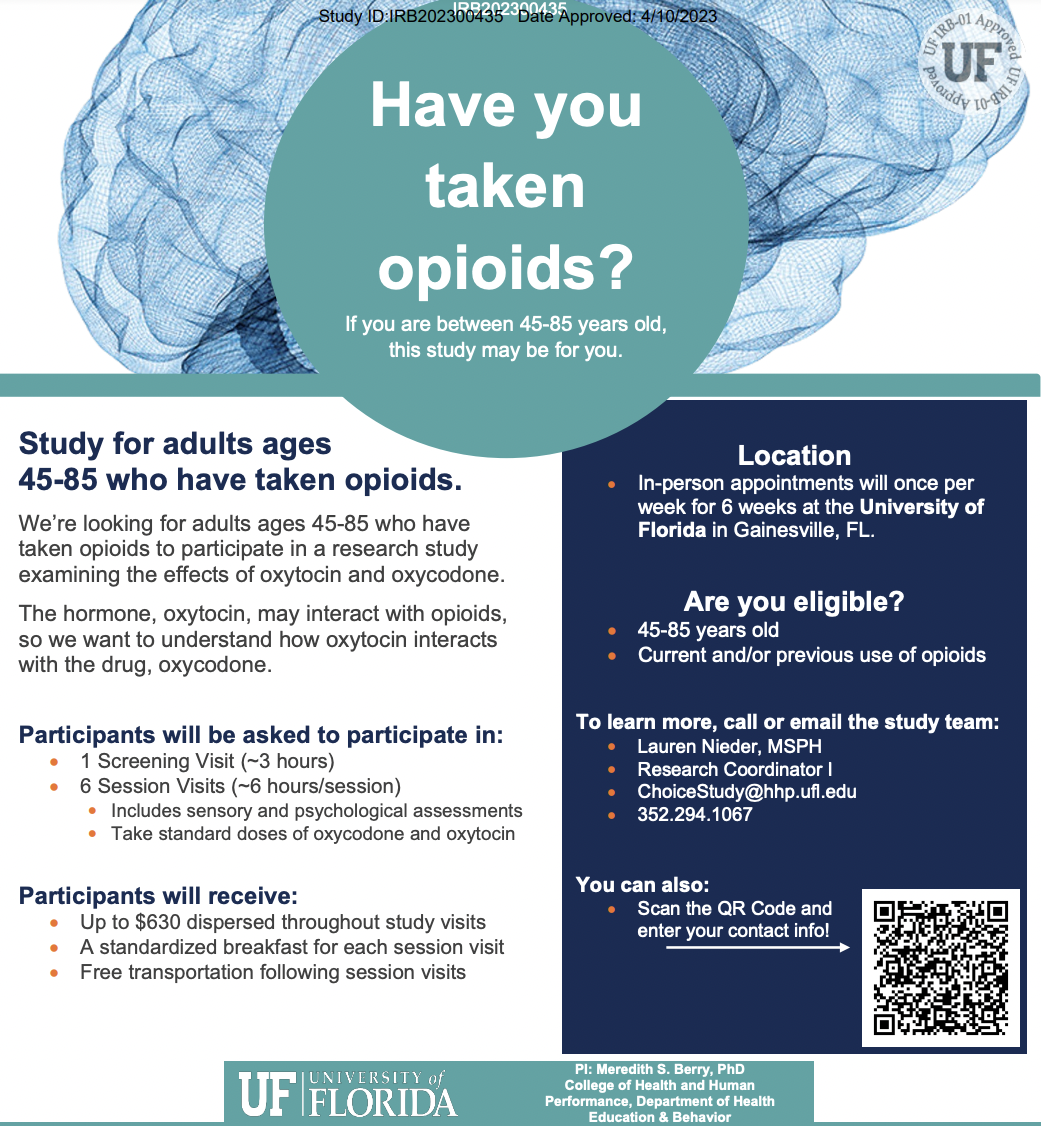
- Have you ever tried opioids (recreationally, prescription, or otherwise)? This project examines the effects of oxytocin and oxycodone on decision-making and behavior.
This study includes 6 in-person sessions. Participants will be compensated for study completion. This study is currently recruiting women and men between the ages of 45-85 years old.
- Click to View Official Study Flier
Non-Recruiting Projects/Studies:
Modeling the Neurocognitive Mechanisms Underlying Fake News Detection Using Artificial Intelligence:
 Fabricated information mimicking news media, referred to as ‘fake news’, is an epidemic deception technique to manipulate public opinion (Pehlivanoglu et al., 2021). Older adults, and especially those with lower cognitive functioning, are particularly vulnerable to deception via fake news (Pehlivanoglu et al., 2022). Currently only technical solutions exist (e.g., fact checking), but fake news continues to break through, leaving human decision making as the last line of defense. Dr. Ebner, Dr. Pehlivanoglu, Dr. Cahill, and their team are working on developing a neural network model to identify deceptive features in news headlines and cognitive characteristics in the decision maker toward enhancing fake news detection.
Fabricated information mimicking news media, referred to as ‘fake news’, is an epidemic deception technique to manipulate public opinion (Pehlivanoglu et al., 2021). Older adults, and especially those with lower cognitive functioning, are particularly vulnerable to deception via fake news (Pehlivanoglu et al., 2022). Currently only technical solutions exist (e.g., fact checking), but fake news continues to break through, leaving human decision making as the last line of defense. Dr. Ebner, Dr. Pehlivanoglu, Dr. Cahill, and their team are working on developing a neural network model to identify deceptive features in news headlines and cognitive characteristics in the decision maker toward enhancing fake news detection.
Characterizing and Modulating Trust-Related Decision Making:
 Many social interactions depend on trust. Older adults may be more susceptible to fraud and exploitation due to age-associated changes in the integration of information relevant to social decision making (e.g., theory-of-mind, memory, and socioemotional processing) (Frazier et al., 2019). Drs. Ebner, Horta, and Lin (together with Dr. Lighthall at UCF and Dr. Wilson at UA) are currently investigating the neurocognitive mechanisms involved in learning to trust and distrust among healthy and vulnerable older adults (e.g., those with subjective cognitive decline, from disadvantaged backgrounds, with chronic pain). Another aim of this research is to test the malleability of the neurocircuitry that underlies trust-learning deficits in aging using real-time fMRI. The goal is to advance understanding of social decision making in aging and develop intervention towards enhancing decision-making capacities and reducing exploitation in older adults.
Many social interactions depend on trust. Older adults may be more susceptible to fraud and exploitation due to age-associated changes in the integration of information relevant to social decision making (e.g., theory-of-mind, memory, and socioemotional processing) (Frazier et al., 2019). Drs. Ebner, Horta, and Lin (together with Dr. Lighthall at UCF and Dr. Wilson at UA) are currently investigating the neurocognitive mechanisms involved in learning to trust and distrust among healthy and vulnerable older adults (e.g., those with subjective cognitive decline, from disadvantaged backgrounds, with chronic pain). Another aim of this research is to test the malleability of the neurocircuitry that underlies trust-learning deficits in aging using real-time fMRI. The goal is to advance understanding of social decision making in aging and develop intervention towards enhancing decision-making capacities and reducing exploitation in older adults.
Delineating Psychological Correlates of Deepfake Detection:
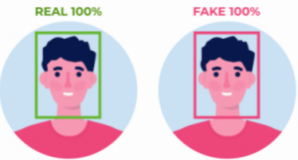 FINS faculty members Drs. Ebner, Cahill, and Woodard together with postdoctoral fellow Dr. Pehlivanoglu and their teams are working toward examination of human factors involved in deepfake detection. The main areas of investigation include the determination of how well humans can dissociate deepfake from real face images and videos; and the identification of psychological and cognitive processes (e.g., reasoning, attention) that underlie deepfake face detection. The group is also interested in understanding how human performance compares to machine (classification algorithm) in deepfake face detection.
FINS faculty members Drs. Ebner, Cahill, and Woodard together with postdoctoral fellow Dr. Pehlivanoglu and their teams are working toward examination of human factors involved in deepfake detection. The main areas of investigation include the determination of how well humans can dissociate deepfake from real face images and videos; and the identification of psychological and cognitive processes (e.g., reasoning, attention) that underlie deepfake face detection. The group is also interested in understanding how human performance compares to machine (classification algorithm) in deepfake face detection.
List of Past Studies:
- Self and Others Study
- The focus of this study was to understand susceptibilities to deception and scams across the lifespan
- Flexible Brain
- The focus of this study was to learn more about how the brain works when we think
- News Study
- In this study, researchers examined perceptions of news articles
- Decisions Study
- In this study researchers examined decision-making in women and men, aged 65 and older
- Authentication Study
- In this study researchers examined which method of authentication on computers and other devices is easier to use.
- Developer Code Perception Study
- This study examined how developers interpret and reason about code and how this ability is associated with cognitive functioning and personality.
- Daily Internet Study
- This study examined daily internet use in young and older adults in aging.
- Spam Study
- This study examined the nature of spam (e.g., how it lures users into clicking or viewing malicious content) received by young and older internet users.
- FACES Study
- This study investigated the influence of a single-dose processing in young and older adults.
- Social Memory Study
- This study examined the extent to which the self-relevance of information (e.g., related to age or personality traits) affect memory in young and older adults.
- Face-Name Memory Study
- This study investigated the effect of positive and negative performance feedback on memory for faces and names in young and older adults.
- This study investigated the effect of positive and negative performance feedback on memory for faces and names in young and older adults.
- Florida Lifestyle Project
- This study focused on healthy decision-making, and the affects of mental time-travel (to the past and the future) on the healthiness of everyday lifestyle choices in young and older adults.
